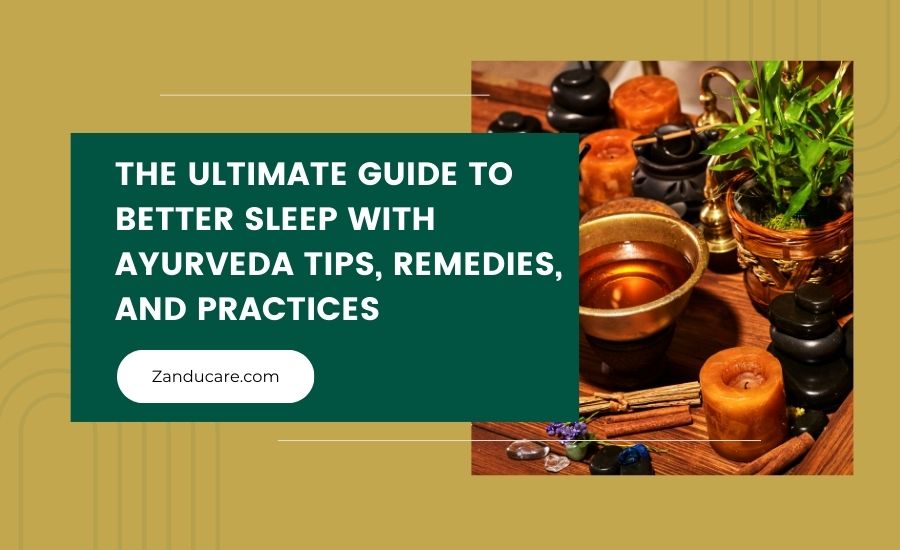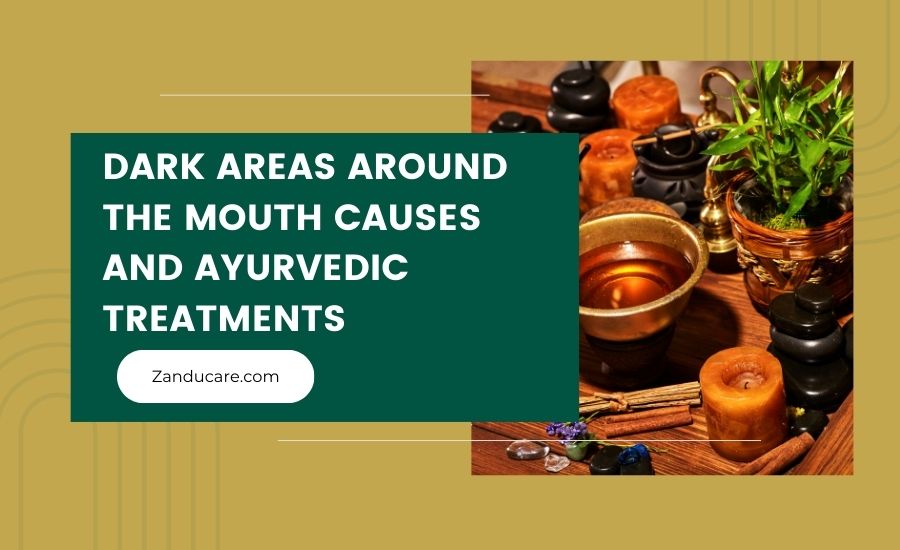
Ayurvedic Tips, Remedies, and Practices for Better Sleep
Getting enough sleep is crucial for preserving general health and well-being. It enables the body to recover, rest, and regenerate, enabling us to perform at our highest level daily. When we don't get enough good sleep, we can suffer from a variety of issues, such as impaired immunity, mood fluctuations, difficulty concentrating, and an elevated risk of chronic illnesses.
The age-old Indian medical system, Ayurveda, provides a comprehensive strategy for raising sleep quality. It focuses on harmony between the mind, body, and spirit and uses natural cures and lifestyle choices to encourage sound sleep. Ayurvedic principles, combined with our knowledge of our specific body types, allow us to design a sleep schedule that suits our needs. This article covers a variety of Ayurvedic techniques, treatments, and advice aimed at improving general health and quality of sleep.
Understanding sleep according to Ayurveda
According to Ayurveda, sleep, or nidra, is essential for overall health and well-being. Along with diet and lifestyle, it is one of the three foundations of life. Sleep aids in the equilibrium of the vata, pitta, and kapha doshas. Every Dosha represents various components and bodily processes.
Vata (movement and communication), Pitta (digestion and metabolism), and Kapha (structure and lubrication) all remain in balance when one gets enough sleep. The Doshas are balanced when the body operates at its best, and we are in excellent health.
The body (Sharira) and the mind (Manas) are essential to get a good night's sleep. While a comfortable body helps us stay asleep through the night, a tranquil mind facilitates easy falling asleep. Ayurveda suggests that routine sleep schedules, warm oil massages, and meditation complement these elements and encourage deep, restorative sleep.
Common sleep disorders and Ayurvedic perspectives
Insomnia (Anidra)

Having trouble falling or staying asleep is known as insomnia. According to Ayurveda, sleeplessness is caused by an imbalance in the Vata Dosha, which regulates the nerve system and movement. To alleviate this, Ayurveda suggests soothing techniques like meditation, warm baths, and warm milk with a bit of nutmeg before bed.
Sleep Apnea
Breathing interruptions occur when a person has sleep apnea. According to Ayurveda, this results from an imbalance in the Kapha Dosha, which governs structure and stability. To treat sleep apnea, Ayurveda suggests eating light, regular exercise, and avoiding large meals right before bed.
Restless Legs Syndrome (RLS)
RLS causes painful leg feelings and a compulsion to move them, which interferes with sleep. According to Ayurveda, this is caused by an imbalance in Vata that affects the nervous system. Warm sesame oil applied to the legs, mild yoga, and consumption of Vata-balancing meals such as cooked vegetables and grains are some examples of Ayurvedic remedies.
Narcolepsy
Sudden sleep periods and extreme daytime tiredness are symptoms of narcolepsy. Ayurveda associates this illness with imbalances in the Doshas of Vata and Kapha. Treatment includes stimulating herbs such as Brahmi, maintaining regular daily routines, and ensuring a balanced diet promotes healthy digestion.
Nightmares
Regular nightmares disrupt sleep and could indicate an imbalance in the metabolism- and heat-regulating Pitta Dosha. Ayurveda suggests consuming sweet, bitter, and astringent meals, avoiding hot foods, and engaging in soothing activities like moon bathing and meditation to balance Pitta.
Sleepwalking (Somnambulism)
Sleepwalking is the practice of moving or doing tasks while unconscious, usually due to mental imbalances caused by an unbalanced Vata and Pitta dosha. According to Ayurveda, avoid stimulants like caffeine and sugar before going to bed, establish a peaceful sleep ritual, and engage in grounding exercises like regular Abhyanga (oil massage).
Ayurvedic tips for better sleep
Here are some of the Ayurvedic tips for better sleep:
Early supper
A large, late supper weakens your digestive system and prevents a good night's sleep because it requires more energy from your system than it can provide. Ayurveda suggests having a small meal close to twilight, saving at least two hours before bed, and making lunch the largest meal of the day (when the pitta fire of digestion is strongest).
Self-massage for better sleep
Abhyanga, another name for daily self-massage, is rubbing warm ghee or sesame oil into the scalp and soles of your feet. Refraining from exerting excessive pressure on the head is crucial to avoid overstimulation.
A warm bath after a light full-body self-massage can help people with modest sleep problems. A nighttime full-body oil massage has been demonstrated to enhance significantly good sleep cycles in postmenopausal women with sleep abnormalities.
Follow Ayurveda wind-down rituals (Shamana Karma)
Rather than rushing into bed, establish a calming pre-sleep routine based on Ayurveda's "Shamana Karma," which includes mild yoga positions, meditation, and targeted breathing techniques (pranayama) to soothe your nervous system and mind.
Reducing alcohol consumption
The pitta-provoking, acute fire of alcohol may not be helping if you wake up in the middle of the night with hot flushes, sweats, or sweltering feet. Alcohol frequently aids in sleep at first, but overstimulating the liver—an organ associated with pitta—causes agitation and a fiery state of mind and body. See how much better your sleep is at night when you cut back on or avoid alcohol.
Practice gratitude
One easy habit you might get into if you have trouble falling asleep at night is practising thankfulness. With your eyes closed and lying on your back, take a moment to softly consider all the good things in your life and the times you were grateful for what happened during the day.
Gratitude is a sattvic feeling distinguished from tension and stress by its nourishing and uplifting effects on the mind and body. The more thankfulness you practice on a regular basis, the more it becomes second nature.
Unplug and unwind
Although everyone adores their smartphone, excessive electric energy can exacerbate Vata, the dosha in charge of movement, and result in sleepless nights.
To protect your eyes and neurological system from strain, avoid using TVs, laptops, smartphones, electronic games, and other gadgets after 8:00 p.m.
Instead, engage in calming, grounding activities such as reading, doing some light yoga stretches, taking a hot bath with lavender essential oil or a DOSHA-BALANCING AROMA (use whichever smells the best at the moment), spending time with loved ones, lighting a candle, and listening to calming music.
Regular exercise for good sleep

Consistent physical activity is crucial for maintaining physical well-being and supporting mental well-being. This is essential for resolving stress and treating sleep issues. Avoid using any stimulant in the evening to avoid disrupting your sleep.
Also, do check our related guides:
Herbal remedies to treat sleep problems

There is an Ayurveda treatment for every type of sleeping condition, and Ayurvedic medications are the most natural way to cure illnesses.
Ashwagandha
This is an overall tonic for increased longevity and vigour. It improves the mind-sense coordination that Ayurveda says is necessary for restful sleep. Half a teaspoon of powder given at night with warm milk or sugar plus ghee is recommended.
Warm water with ghee
In Ayurveda, ghee is highly valued for its nutritional qualities. Before bed, try brewing a cup of warm water with a spoonful of ghee to help soothe your mind and promote restful sleep.
Valerian
Valerian, or Tagar in Hindi, is an Ayurvedic herb for insomnia that acts on the nerve channels by eliminating toxins from the blood, joints, tissues, bowels, and nerves. Its primary function is to regenerate. But valerian shouldn't be used by itself. Because of the potential dulling impact. The best way to use it is in a herbal concoction. You can speak with an Ayurvedic if you would like to discuss any particular issue.
Ikshu (Sugarcane)
Eating foods that naturally taste sweet, such as Madhura Rasa, is a beautiful remedy for chronic insomnia. Sugarcane or Ikshu juice extracts are high in Tryptophan, converted to serotonin. This major neurotransmitter reduces stress and cortisol levels while also regulating mood, memory, and sleep, providing restful sleep at night.
Brahmi
It is an effective brain tonic that enhances and supports every facet of mental health. This herb has a calming and relaxing effect. When consumed at bedtime, a cup of Brahmi tea, powder, or any other preparation containing Brahmi will promote restful sleep, and frequent usage will aid in treating insomnia.
Anxiety and mental restlessness are two of the most common culprits behind disturbed sleep. Ayurveda addresses these root causes through natural herbs like Ashwagandha and Brahmi. To learn more, check out our curated collection of Ayurvedic medicines for sleep and find safe, non-habit-forming options to restore your sleep cycle.
Comparison table: Ayurvedic remedies vs. modern sleep aids
|
Aspect |
Ayurvedic remedies |
Modern sleep aids |
|
Approach |
Holistic focuses on balancing doshas |
Typically targets symptoms directly |
|
Ingredients |
Natural herbs like Ashwagandha, BrahmiSynthetic chemicals or compounds |
Synthetic chemicals or compounds |
|
Mechanism |
Calms the mind, reduces stress, balances the body |
Alters brain chemistry to induce sleep |
|
Side effects |
Generally few; improper use may cause digestive issues |
It can cause dependency, dizziness, dry mouth |
|
Time to effectiveness |
It takes a few weeks for a noticeable improvement |
Often works within hours |
|
Safety |
Safe with proper guidance; minimal risk |
May have interactions with other medications |
|
Dependency risk |
Low risk of dependency |
High risk of dependency and tolerance |
|
Long-term use |
Safe for long-term use |
Long-term use not recommended |
|
Cost |
Generally Affordable |
Can be expensive |
|
Accessibility |
Widely available in health stores and online |
Requires prescription or OTC purchase |
|
Customisation |
Personalised treatment plans |
Standardised dosages |
|
Lifestyle integration |
Integrates with diet, yoga, and meditation |
Often used as a standalone treatment |
|
Focus |
Treats underlying causes |
Treats symptoms primarily |
|
Holistic benefits |
Improves overall health and well-being |
Primarily improves sleep |
|
Cultural acceptance |
Rooted in ancient traditions |
Modern scientific approach |
|
Consultation needed |
Ayurvedic practitioner |
Healthcare provider |
Conclusion
Overall health depends on getting enough sleep, and Ayurveda provides practical sleep-enhancing methods. The Doshas (Vata, Pitta, and Kapha) can be balanced to treat common sleep disorders such as restless legs syndrome, insomnia, and sleep apnea. Natural sleep promotion techniques from Ayurveda include heated oil massages, meditation, and dietary modifications. Accepting the comprehensive philosophy of Ayurveda can result in improved well-being, healthier living, and better sleep.
FAQs
1. What is the best Ayurvedic remedy for insomnia?
Ashwagandha is the finest Ayurvedic treatment for sleeplessness. It naturally eases tension, quiets the mind, and encourages deeper sleep.
2. How does Ayurveda help with sleep disorders?
Ayurveda helps with sleep disorders by balancing the body's doshas, herbs, diet, and lifestyle changes to promote relaxation and reduce stress.
3. Are there any side effects of Ayurvedic sleep remedies?
The adverse effects of ayurvedic sleep aids are typically minimal. On the other hand, mishandling or using the wrong dosage could lead to stomach problems or interfere with other prescriptions.
4. How long does it take for Ayurvedic treatments to improve sleep?
Ayurvedic treatments usually take a few weeks to show improvement in sleep. Consistent use of herbs and lifestyle changes are essential for long-term benefits.
5. Can Ayurvedic practices be combined with modern sleep aids?
Yes, Ayurvedic practices can be combined with modern sleep aids. However, consult a healthcare provider to ensure safety and avoid potential interactions.
6. What foods should I avoid to get better sleep, according to Ayurveda?
According to Ayurveda, avoid heavy, spicy, oily foods, caffeine, and alcohol. These foods can disrupt digestion and interfere with sleep quality.
Reference:
- Sudden sleep periods and extreme daytime tiredness are symptoms of narcolepsy(https://jcsm.aasm.org)
- Breathing interruptions occur when a person has sleep apnea(https://www.sciencedirect.com)
- Having trouble falling or staying asleep is known as insomnia(https://www.sciencedirect.com)
- This is an overall tonic for increased longevity and vigour.(https://www.proquest.com)





